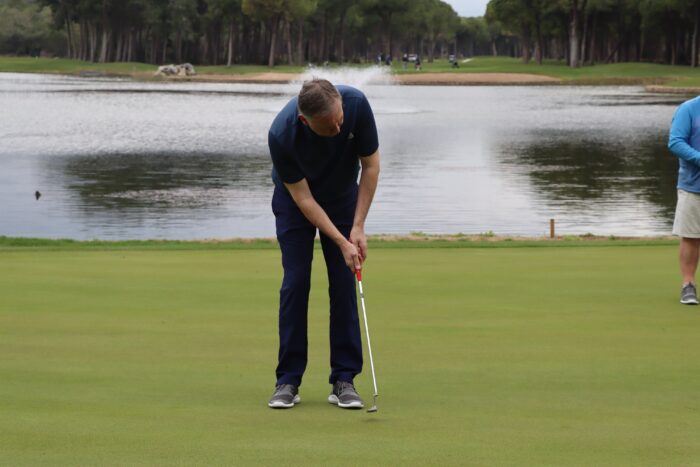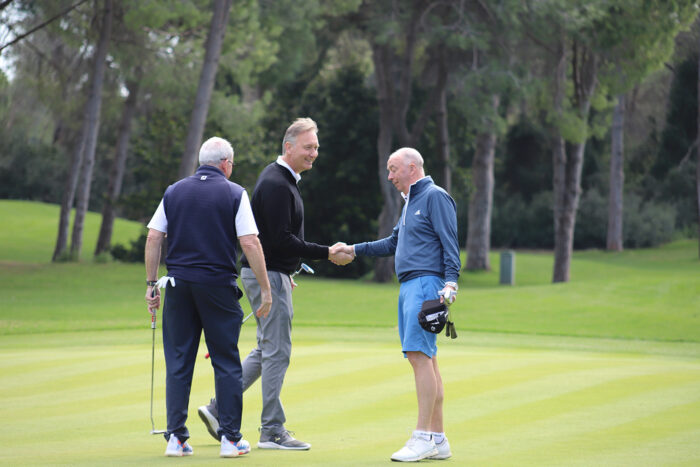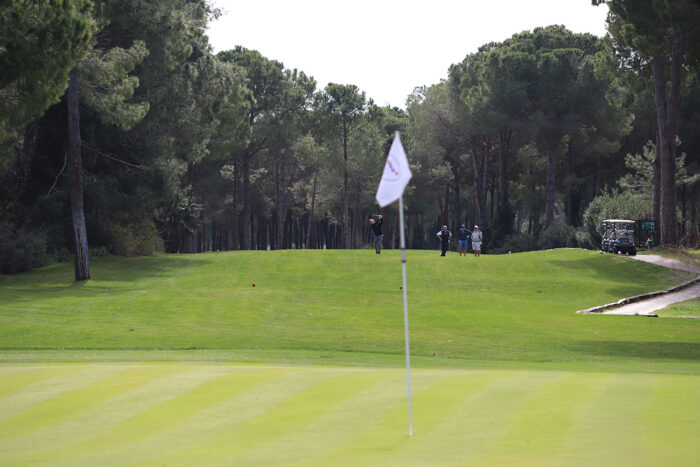Meet the head professional: Mick Taylor
From Shirley Park Golf Club in Croydon, Mick talks about the evolution of a career that started in 1991, how he manages his day amid demands for his time and getting more women and children into the club.
Can you detail what your life was like from the first lockdown in March 2020 until the present day?
The initial fear was the financial uncertainty, the government self-employed help was vital for me.
Once we returned the main problems were dealing with extra demand and also the implementation of new systems such as two-balls only and tee times, none of which could have been envisaged pre- pandemic.
I think this is where experienced PGA professionals come into their own. Our knowledge of our day-to-day business and dealing with people was key in making things work.
Like many clubs we took on lots of new members; with this came much more demand on our time as we were having to deal with way more queries – most pro shops are the first port of call.
Working life has settled back to near normal now. Most changes post-Covid have been positive in my opinion.

What daily challenges do you face in running a pro shop and teaching?
Time management is my biggest issue. Most PGA pros end up doing multiple roles on a daily basis.
High quality staff is key, but very difficult to come by. Also keeping up to date with knowledge. Retailing and coaching methods are constantly moving, you need to have an open mind and just keep learning, no matter what stage of life you’re in.
Managing stock, buying and paying bills are also one of my biggest issues – there’s so much to keep on top of.
There is a constant flow of new golf products – how do you manage your stock to serve the needs of your members and visitors?
My EPoS system is key to observing historical sales. Knowing my margins through stats and experience helps with my buying.
Listening to other PGA pros’ experience with companies and looking at the terms on offer also help.
Being able to pick up the phone and speak to my TGI Golf retail consultant is also a great source of information too, as well as the regular updates we receive from the group.

How do you manage your day?
I have two members of staff who can manage the diary on a daily basis. I designate certain days for specific tasks. For example I teach three or four mornings a week, two days a week I work solely in the shop and dedicate my time just for that.
I will generally meet sales reps in the afternoons as we are always busier in the mornings.
What are you doing to support junior golf and introduce kids to the sport?
One of my assistants is the junior organiser, so we have a direct line with them regarding coaching and organising competitions. Our club is situated next to a school, we have 40 kids from there who are members. In consultations with the sports teacher at the school we conduct group coaching sessions and make sure we have dedicated tee times for the kids.

Are you trying to attract more women to golf?
We have held several women’s taster days with free coaching. We also offer free membership for partners of members who want to get into golf.
Do you have any programmes in place such as academy membership to make it easier to introduce beginners to the game?
We have had an academy membership scheme since 2009. It includes off-peak course access and free lessons. This enables us to develop a relationship with new golfers. Many have progressed on to full membership, so it has been a successful scheme.

A lot of PGA pros are having to be a step ahead of their competitors in their offerings and technology – what additional added value services do you provide?
In 2011 we built an indoor studio with a simulator and went on to install TrackMan in 2015. This has been a game changer in respect of coaching and club fitting.
Consumers now expect nothing less, so if you don’t have some sort of fitting studio or simulator you are certainly falling behind the curve.

When did you join the TGI Golf Partnership and what was it about it that attracted you?
I joined TGI Golf in 2004. I felt it was necessary to join a group as many of my contemporaries whose opinion I respected felt that TGI Golf was the best option. Once I had spoken to TGI there was never the need to consider anyone else. The democratic set up and sense of community really sold it to me.
Has TGI Golf been of benefit to you as a PGA professional?
TGI has been a tremendous benefit to me and my business. Through the group I have developed a much greater understanding of how to run a retail business.
TGI constantly provides the opportunity to learn and develop as well as providing the best terms with suppliers.
Being a part of TGI certainly helps to feel like you are not on your own.

What year did you turn professional and what have been your career highlights, both playing and employment?
I turned pro in 1991. I tried to play for a living, travelling around playing in some early Challenge Tour events and various developmental tours.
Having entered European Tour School unsuccessfully several times I decided I needed a job. I’ve really enjoyed my career as a club pro. Highlights would certainly be the planning and opening of our studio, there were not many around at that time, it was a turning point in my business.
Spending time on the board of directors at TGI Golf was also a highlight. It gave me a real insight into how the group is run and also gave me the chance to meet some great figures within the golf industry.















Let me tell You a sad story ! There are no comments yet, but You can be first one to comment this article.
Write a comment